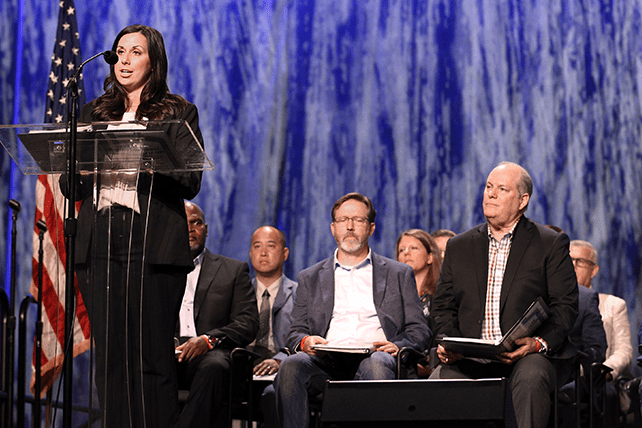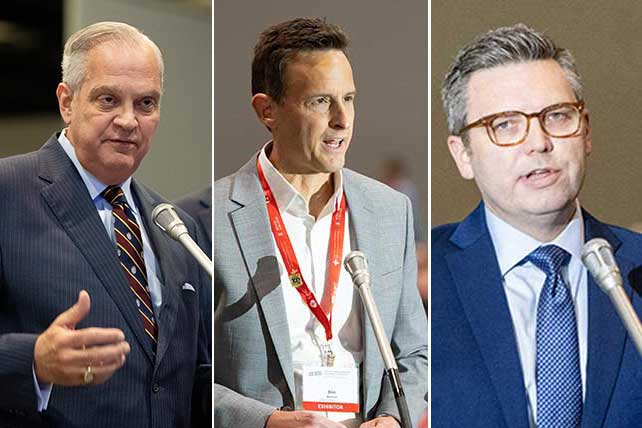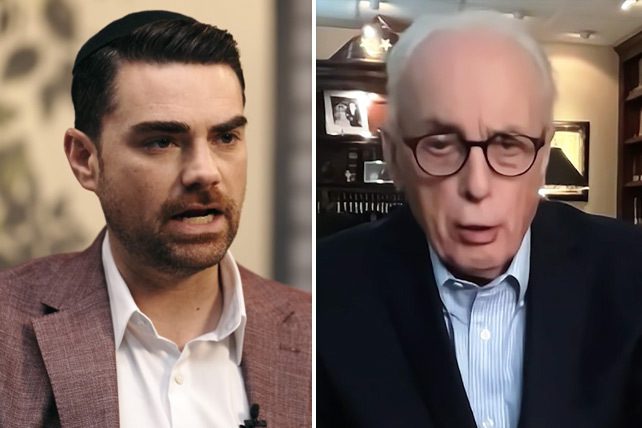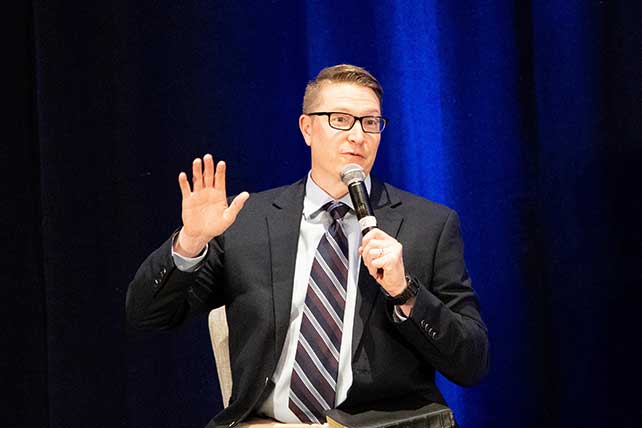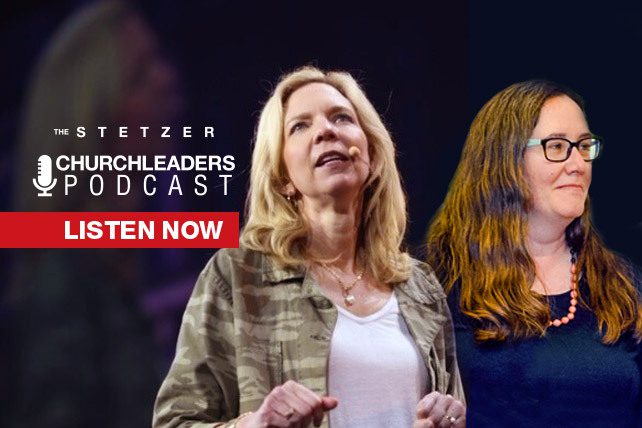Kara Powell and Jen Bradbury–The Stetzer ChurchLeaders Podcast.mp3: this mp3 audio file was automatically transcribed by Sonix with the best speech-to-text algorithms. This transcript may contain errors.
Voice Over:
Welcome to the Stetzer Church Leaders Podcast, conversations with today’s top ministry leaders to help you lead better every day. And now, here are your hosts, Ed Stetzer and Daniel Yang.
Daniel Yang:
Welcome to the Stetzer Church Leaders Podcast, where we’re helping Christian leaders navigate and lead through the cultural issues of our day. My name is Daniel Yang, national director of Churches of Welcome at World Relief. And today we’re talking with doctor Carol Powell and Jen Bradbury. Kerry is the executive director of Fuller Youth Institute, a faculty member at Fuller Theological Seminary, and Fuller’s chief of leadership formation. She’s the author or co-author of a number of books, including sticky Faith and Three Big Questions That Change Every Teenager. Jen serves as a content director at Fuller Youth Institute and as a senior director of family Ministry at First Presbyterian Church in Glen Ellyn, Illinois. She’s the author or co-author of several books, including The Jesus Gap and What Do I Believe About What I believe? Carol and Jen, along with Brad Griffin, have co-authored Faith Beyond youth group five Ways to Form Character and Cultivate Lifelong Discipleship. Now, let’s go to our host, editor in chief of Outreach Magazine and the Dean of the Talbot School of Theology at Stetzer. Okay, Kerry, we’ve had you on before.
Ed Stetzer:
And, Jen, we’re going to bring in the conversation in just a second. But, I mean, you know, that we hear these stats and I’ve written articles kind of debunking one of the stats that says 88% of evangelical youth drop out of church after high school, never to return just because, I mean, even words like never in a study. What do you like? Implant tracking chips in the necks of all teenagers, and have a scanner at every church door to find they never. But there are some real data and real challenges for us to know. So. So when you kind of look at some of the numbers, some of the research you’re doing, and I know there’s multiple angles to go there, but how many young people typically carry their faith, their Christian faith, beyond their church youth groups, into their young adult lives? Yeah.
Kara Powell:
Great question. And you know that that 88% statistic that was floating around for a while, my understanding is it literally emerged from a group of youth pastors in a room guessing. Um, so yes, we need to make sure that we understand.
Ed Stetzer:
You read my article. I’m the one who actually said that. That was from it was from a wonderful group of people who love Jesus. And they’re really sorry, and they won’t do it again. Yeah, but but they and actually the the news organization that ran their story of their press release retracted it, the whole nine yards. I don’t try to embarrass them, but you are correct. It was a group of youth pastors guessing and averaging the guesses. And that’s how we do real research.
Kara Powell:
Yeah, hardly. Let’s get on the record really quickly and dispute that. So, um, but what we’ve tried to do at the Philly Youth Institute is to look at a number of valid studies by Pew, by Barna, etc. and from what we can best understand, somewhere between 40 to 50% of youth group graduates from great churches and youth ministries, from great families like the churches and families of our listeners, today, about 40 to 50% drift from the faith and the faith community after they graduate. Now, there’s some indication that about half of those return, um, when they get older, when they get married, when they have kids. But some are questioning if that’s true with this generation of young people because they’re getting married and having kids later. So those life choice ruts, their road is those ruts are deeper, and it might be harder to get out of and get connected with the church.
Ed Stetzer:
Yeah. And of course, the you’re right, there is a shift. And, uh, I think it was, uh, Vern Bankston in Families and Faith at USC, I think Oxford University Press published it How Religion is Passed on. You know, they were talking about evangelicals. You know, you could be two thirds, three quarters of longer term retention, including those that come back after. But even that’s older data. And people are starting out at a more secular place and a more secular moment. So I think the return to church numbers should be down. So there’s certainly a high level of concern. We might say the majority do, but that’s a large number of people who don’t. So how do you like at the Fuller Youth Institute? Do you like what do you describe that? Is this a is this a crisis? Is this an opportunity? Is this is this a challenge? Is this all the above? Kara I mean, how do you describe the situation so that our listeners can say, this is where we are in a few words? Yeah.
Kara Powell:
Well, I think actually we use all of those words, but if I have to choose one, I would say it’s an opportunity. Um, especially because young people are open to relationship with adults. Now, some of the most disconcerting data that we heard during the pandemic, when it comes to young people, young people’s faith was by Springtide Research Institute that surveyed 13 to 25 year olds, where only 10% of 13 to 25 year olds heard from a faith leader from any religion not just Christianity, but Judaism, Mormonism, etc. only 10% now Christians were higher at a whopping 12. Percent. Ooh I know woo. Um, 20% higher if you really want to be a glass half full person, but but in all honesty, I mean, 12%. I don’t know if I’m more mad or sad by that, but I’m I’m equally feeling both. Now, here’s the good news, though, that in that same study, 70% of 13 to 25 year olds said they had a new appreciation for relationships, a new openness to relationships. So if we have to choose one word, we would say opportunity. That this generation that’s experienced mental health crisis that has gone through the isolation of the pandemic, they’re hungry to connect with adults, and that’s part of the opportunity that we think we have in building a faith beyond youth group.
Ed Stetzer:
Yeah. And again, the title of the book is Faith Beyond Youth Group five Ways to Form Character and Cultivate Lifelong Friendship. And I want you to know that, like I resonate with so much with this book, when I was, I was I came to Christ in the charismatic movement of the Episcopal Church, and we ended up in this little Episcopal church. Plant didn’t have much of a youth group, and there was this volunteer guy who was an insurance. He worked in insurance, I think it was an insurance salesman. And there were like three of us and no professional youth pastor, just some guy who sold insurance name was Steve, and he he didn’t know what he was doing. But when we went to learn about discipleship, I wanted to learn more. He said, well, let’s go store and buy a book on discipleship. And and we and we and we did, and we learned and we read it together. And he discipled me. He mentored me. And what’s I mean, that was when I was, what, like 16. And when I got married, he we were actually so close. He’s in my wedding. So it’s, you know, it’s it’s young friend, young friend, young friend, old dude in my wedding pictures that are there. But I deeply credit my spiritual journey. And with having this person, this figure in my life. And you talk about some of those, you know, five ways to the subtitle of the book Faith youth Group is five Ways Form Character and Cultivate Lifelong Discipleship. So, Jen, first time on the podcast. Glad you’re here. And thank you for your work there. You’re just I used to be just down the road to Wheaton. You’re the senior director of family ministry at First Pres there in Glen Ellen. So tell us a little bit about that particular aspect. I know that the relationship with adults is a key thing. And then we’re going to walk through some of the other points of faith beyond youth group, compass and more. But talk to us a little bit about that, that particular part of it.
Jen Bradbury:
Yeah. Thanks for having us, Ed. And the relationships with adults is in fact a key area here, and I am seeing this play out in real time in my own role in the church right now. So I started in February. And in the book we talk about how cultivating trust is kind of that first compass point and in the ministry that I am in, but in the ministry that’s so many of my pastor peers are in right now. We are working from a trust deficit, particularly with young people who just don’t inherently trust the church in the same way that some older generations have this positional authority that make them feel like, oh, churches are trustworthy. Our teenagers today are middle schoolers. Today they don’t have that. And so, particularly in the wake of Covid, we are walking into these rooms full of kids who just inherently feel like, why am I here? Can I trust you? Are you going to show up? Are you just trying to get me to do something? So like the behavioral modification piece of that and we have to work over time in order to re-instill that trust with young people so that we can form the relationships that you’re talking about, Ed, that have those long term implications. And I’ve been lucky to have those in my own life, both as a kid who had those adults pouring into and investing and in my lifetime in ministry, you know, to have the girl who’s about to turn 30, who invited me to her big 30th birthday party because I am that person. Right? And like you said, it’s the young person. Young person, young person, and then me. Um, but it’s all those conversations about faith and Jesus. And what does it mean to live out your faith in real time that kids and young adults are just hungry for right now?
Ed Stetzer:
Yeah, it’s and it’s it’s the quote I get the most complete, most quoted on most complaints about related to student ministry is was in USA today years ago at LifeWay research. We did a study on dropouts, which by the way, the numbers sort of reflect the numbers that you said at the beginning. Kara. So there are realistic studies about dropouts and then returns are key. So and, you know, we don’t want to drop out at all. And one of the ways for the resilience in faith is, well, some of the stuff we’re going to talk about in this compass. But but I said and youth pastors got mad at me and I thought I was trying to help. I said, listen, too many youth groups are four year holding tanks with pizza and and. People got mad at me and I was just trying to say, let’s not do that. But that’s part of what you’re calling for is a different approach to what we might call youth or student ministry. So talk to us a little bit about that and kind of maybe introduce some about the youth group compass that you talked about. Jenn.
Jen Bradbury:
Yeah. So in our research for this book, we started with a survey of youth leaders all across the nation. And then we went deeper with interviews. And then we actually visited people on the ground to see what they were actually doing in their ministry and congregations. That kind of rose up as being noteworthy in terms of instilling faith beyond youth group. And what we started to see where there were these elements that became the Faith Beyond youth group compass, that all these ministries were doing that are really critical in developing a long term faith that lasts beyond youth group. And so it’s this idea of cultivating trust, which I just talked about, a little bit of modeling growth. So this sense of young people don’t want their leaders to be perfect or to pretend to have all the answers to their faith. They want people who are going to walk alongside of them in the tricky spaces, in the wondering and the questioning and the doubting, and be authentically imperfect. To own their mistakes, own their failures. Uh, then this idea of teaching for transformation, which is a big one for us. And so it looks at what have youth groups been doing and what is and isn’t working. We all agree that teaching is a big piece of what needs to happen. We need to pass down information. And yet what we found is that there are some ways of doing that that work better than others. And asking young people questions is a real key to help them really wrestle with and own their own faith for themselves. And then the last two, which really kind of go hand in hand, are this idea of practicing together and making meaning.
Jen Bradbury:
So practicing together, we like to talk about it in the same way that you go out and you practice a skill that you are trying to get better at, whether it’s piano or you’re learning or training to run a marathon, you go out every single day and you work hard on that. We want young people to have that sort of mentality with their faith that they are going to go out and practice together. So not just alone, but with people from their youth group, with parents, with families, with the adults who are discipling them to wrestle with in real time. What does it mean to live this out in my daily life, whether that’s at school or work or in their family unit and system? And then as they are doing that, one of the big roles of youth leaders is to help them make meaning. So that sense of we need to help young people integrate their faith into their daily lives. And a part of that means really wrestling with these key questions. When we see current events that make us go, what on earth is happening here? To realize that young people are getting those notifications on their on their phones. They’re seeing those stories on TikTok, on Instagram, and they want to talk about it, and they want to wrestle with, what does this mean for my faith? And where is Jesus in the midst of this? And how are or aren’t people actually living out their Christian faith and character, which is so central to this book as they’re navigating these realities?
Ed Stetzer:
Yeah, and important to note, that character is kind of a central theme throughout the book. We’re going to come to that as well. Again, the books Faith Beyond Youth Group Five Ways to Form Character and Cultivate Lifelong Discipleship. I’m not sure who wrote this sentence, but one of you wrote, and I’ll throw the question to you, Cara. But character is what extends faith beyond youth group. So how does character fit in? Why is that such an important part of it?
Kara Powell:
Yeah, I’m not sure who wrote it either. And and just to note that Jen and I are two of the three authors, but our good friend Brad Griffin.
Ed Stetzer:
Yeah, but I’ve had Brad riff, I’ve had Brad on before, and I don’t think that was him who wrote that sentence.
Ed Stetzer:
But okay, well, I.
Kara Powell:
Can’t be as sure as you, but I’ll lead it to what you said. You know, Jen touched on this before, that young people, when they see the church, they see us not being very loving. They see us being judgmental. They see us being unkind. And that’s part of why they’ve lost trust in the church and frankly, Christian adults.
Ed Stetzer:
The Setser and Church Leaders Podcast is part of the Church Leaders Podcast Network, which is dedicated to resourcing church leaders in order to help them face the complexities of ministry. Today, the Church Leaders Podcast Network supports pastors and ministry leaders by challenging assumptions, by providing insights and. Offering practical advice and solutions and steps that will help church leaders navigate the variety of cultures and contexts that we’re serving and learn more at Church leaders.com/podcast network.
Kara Powell:
Young people today in general are not trusting institutions and I think the church and politicians, we are sadly like neck and neck at the bottom when it comes to young people’s trust. Now, what does this generation value? They value love in action. And so for us that translates into character. Um, and I’ll tell you, we had some really lively discussions about how do you define character, because a lot of times, you know, character sounds like what your grandma talked to you about or character sounds like a bunch of lists of do’s and don’ts, or maybe handouts from third grade that you would get from your school or the YMCA. So we went with the different definition of character, and I love this definition. It’s living out Jesus’s goodness every day by loving God and our neighbors. So it’s grounded in love. How we love God and we love others. And it’s following the model of Jesus. And that’s the kind of character that’s compelling to young people and generates a faith that doesn’t just last for 75 minutes in youth group, but all seven days of the week. And that’s what I know your listeners and all of us are all after.
Ed Stetzer:
Yeah. When I was in high school, I, I started again. I was very influenced by that guy. Steve started a Bible study in my high school, which is where I met my now wife. She came to the Bible study. So winning.
Kara Powell:
Awesome.
Ed Stetzer:
You know, it was so cute. It was so cute. I just like to bring in stories about Donna because she’s awesome. But I met.
Kara Powell:
My husband on a mission trip, so you never know how God’s gonna work in those kind of catalytic events.
Ed Stetzer:
What the Lord might do. Yeah. Um, but I would say, too, like, we’re right now, they’re trying to decide if we’re going to our high school reunion. And, you know, part of the thing is, like, everyone sort of knew me as, you know, the Bible study kid. But I also did get suspended for, you know, some, some things. I we were playing a game with squirt guns. And anyway, you can’t do that in, uh, in school. And so, you know, so I was one of those people who, like, my character, was still forming and catching up. Yeah. And you talk some about that. And so let’s have both of you, Cara, first and then write to Jen. Just, just follow right after her is what about when kids are acting one way at youth group and an entirely different way outside of it, which we see a lot? How do you help close that gap? Why do those gaps exist? Well, first.
Kara Powell:
Off, first off, it’s a good thing that teenagers are the only ones who act one way at church and a different way everywhere else. So I say that very flippantly and sarcastically, because I think all of us, regardless of our level of spiritual maturity, we’re tempted to compartmentalize our faith. So really, this is an invitation for all of us. Um, a couple thoughts come to mind. One is we also, I gave you our definition of character. We also asked young people for how they would define character. And my my favorite definition was a young person who said who you are mostly, um, and that mostly is key because, you know, we all have blips where we don’t live up to who we want to be when it comes to character. So I would say, you know, let’s acknowledge that as this young person did so brilliantly. And the second thing that I would say is if any of us were perfect, then we don’t need Jesus. We need Jesus because of our sin, because of the way that we are not loving, because of those dips in character. So I would say a healthy youth ministry while elevates character, it also gives opportunities for all of us young people, adult volunteers, youth pastors, uh, to confess either publicly or privately ways that we’re not living out to who we’re not living up to, who we want to be, and experience the forgiveness and the grace of Jesus in the midst of all seasons, but including those seasons where where we’re failing, struggling, sinning.
Jen Bradbury:
Yeah, and I love what Cara said there, and especially the part about how it’s all of us that is struggling with that. But I would also add, I think there’s something real and specific in terms of adolescence and just what is happening in their development. Yeah. And so part of adolescent development is this idea of they are trying to figure out who they are. Identity is so key for them. And part of that identity is that they are everywhere they go. They are asking this question of who am I? And so in each of those places, sometimes different things are sort of rising to the surface of how they interact in that particular space. And so I think part of our youth ministry world, our student ministry world, our church world, is this sense of helping to call out and ground young people in this identity, that they are God’s beloved child, no matter where they are, whether they’re at school, in their family, in the community, etc.. And once we can do that and that becomes a primary identity for young people, it becomes easier for them to start living out their faith, to start being who they are in church and at school. And you see more resonance in that person.
Ed Stetzer:
Yeah, it makes sense. Um, you know, so from 1986 to 1988, I was a youth pastor, and it was two of the longest years of those students lives. And, um, and it wasn’t, it wasn’t I wasn’t great. But, you know, as I kind of, you know, looking through like, the compass. Yeah, I didn’t and this is like, probably I’m trying to figure out how best to say this. I didn’t find any of them, like, incredibly shocking or surprising. Yeah. Yet. Yet yet still very helpful because it seems that we don’t do. But we sort of like if you sat down and said we should do these things, I think most youth pastors would maybe come up or, you know, volunteer. Let’s not just say pastors, but volunteer leaders would come up with some of those things, but you put them together. Helpful description and pattern. So why don’t we do what some of those things seems like we would know we should do? What are barriers to these practices?
Kara Powell:
Yeah. Well, I think a lot of times we have misconceptions about what each of those things might be. So, you know, we’ve talked a little bit about the first point in the compass, which is to build trust. Um, the second point in the compass is to model growth. And note we didn’t say model perfection. No, we didn’t say model godliness, but model model the highs and lows of what it means to be a human pursuing Jesus. So Jen mentioned that we did site visits as part of our research, which is always my favorite part of the research process to show up at a church, listen, look around and learn so much. And so one of the churches that I got to visit, um, the we were talking to a small group leader, and it was about a year after the pandemic. And so he he recounted a story from the pandemic when they were still doing zoom, Bible study, zoom small groups. And, you know, he’s doing zoom, small group discussions with high school guys. Not always the easiest thing in the world, but but the one thing that went really well is he would ask for prayer requests, and the guys would take turns sharing what they wanted to see God do in their life. Um, and and in the midst of that, one of the, one of the young men chatted the leader personally during zoom privately and said, hey, can we talk after everybody logs off? And so the leader said, yes, absolutely.
Kara Powell:
Um, and and so the leaders stayed on for the zoom extra, some extra minutes thinking, you know, this young man has some burden. He wants to talk to me about something he’s really struggling with. You know, I certainly want to be there for him. But he was surprised when the young man said, you know, I noticed that when we were sharing prayer requests, you didn’t share your prayer requests. So I’m just wondering how I can be praying for you. And and, you know, the adult was touched, honored, shared the prayer request, and the young man prayed for him on the zoom before they both logged off. And, you know, to me, that’s an iconic example that just taking one of the five points of the compass, we think what we’re supposed to model is victory. But what young people want to be aware of is also our struggles. Because if they hear about our struggles and the way we experience Jesus in the midst of it, then they will know that Jesus can be with them in the midst of their struggles and doubts, too. You know, in the midst of so many people, so many and young people especially, kind of deconstructing their faith, part of the part of the tragedy in that deconstruction process is that they leave the faith community because they haven’t seen adults wrestling with big questions about God, which I think, if we’re honest, we all have, um, if we could figure everything out about God, God wouldn’t be God.
Kara Powell:
God would be just, uh, cool guy. So the fact that there are elements of God that we can’t figure out is part of what makes God God. And if we’re honest about that and model, hey, here’s what I’m wrestling with when it comes to suffering, when it comes to this pain in our world or my life, then that lets young people know that they can bring all that to church too. Now, last thing I’ll say is, as adults, we need to do this in developmentally appropriate ways. As Jen well pointed out, these are these are young people. These are minors. They are different developmentally than us. So we don’t want to emotionally vomit all of our struggles on them. But giving young people enough of a glimpse that they know that we’re real and we’re experiencing the real God in the midst of our real highs and lows. That’s that’s what it means to model growth. So and I think it’s looking at these five things and understanding some of the misconceptions we’ve had and what it really takes today to build long term faith in young people.
Ed Stetzer:
Yeah. Let me let me just review everyone so they’re aware. And I know you, you wrote a whole book and they unpacked in there. But just so we went through them Jen mentioned some you and some it’s cultivate trust, model growth, teach for transformation, practice together and make meaning. And they’re called unpacked. They’re more in the book which I encourage you to I commend you to get faith beyond youth group five ways to Form character and Cultivate Lifelong discipleship. So so to you, Jen, if I if I want to if I’m a youth pastor, which I would tell you would not be a good thing. But if I were a youth pastor or youth leader, um, I will tell you this. The group I’m most afraid to talk to is teenagers. Like, I get an invitation to speak at a high school, and it’s it’s terrifying to me. But, um, you know, my my, my my daughter asked me, uh, she says, do you get nervous speaking? And I said, only when I speak to people your age. So, um. So, so but but how would then youth volunteer pastor? Because a lot of our listeners will be pastors and they might. And I encourage you, if you’re listening and you’re not working with students to pass this on to somebody who is as well. But what would your encouragement to that youth worker or that youth pastor who wants to begin to implement some of these, this advice around the compass and more?
Jen Bradbury:
Yeah, I love that question, and in part because I’ve seen this play out in real time in my setting. So one of the things that I have been able to do is I have a team I oversee, you know, a staff of children’s and student ministry leaders, both volunteer and paid. And so when I started, we started walking through Faith beyond youth group. And so I wanted to give everybody a common language and an. Ability to just sort of be on the same page. And so we’d read a chapter and we’d come and we’d have a conversation about it. And what I saw that was so encouraging to me is that many of my leaders don’t have formal training, and what they saw is that this feels really accessible. So one of my leaders, Courtney, even made the statement of, I think we’ve overcomplicated this. And so this element of this thing that had just felt so vast and so complicated and had all these moving pieces that when we distilled it in this way of the five compass point, Courtney was like, okay, I can do that. I know how to cultivate trust with young people, and if that’s what it takes, like I have what it takes. I can sit down with a teenager and take them out to coffee, and we hear that same kind of thing every time that we are out speaking. Is this sense from youth leaders of I can do this. And one of the reasons that we frame this as a compass, rather than as like a linear scale or journey is this element of we at FII believe a lot in the idea of contextualization. And we saw this again and again in our research that even though these five different practices were always there in churches and ministries that were doing faith beyond youth group, they happened in different orders.
Jen Bradbury:
And so even though we often talk about cultivating trust as sort of the starting point, it doesn’t have to be. And so I have heard from youth leaders who have taken this and been like, the thing that I am going to work on first is practicing together because we have a mission trip coming up, and that’s an ideal moment and opportunity for us to really focus on that element. And then with that, the making meaning comes naturally because they start to debrief and to process the events and what they’re doing and how they’re serving. And again, where Jesus is, I’ve seen other people, including the intern at my own church who was like, it’s got to be teaching for transformation. We’ve got a room full of 60 middle schoolers, and we are using content that is not connecting. So what do we actually get to do that can help them think about this differently and actually meet Jesus in our time together, rather than just sort of like sit back and inhale it. Right? Like the consumeristic mindset that is so often a part of ministries. And so that diversity and that ability to adapt is something that I think is really helpful. So my advice to youth leaders would be think about what either your strengths or your weaknesses in this compass model are, and pick one or the other. Either go off of your strengths and build from there, or take the thing that you are weakest in and figure out what’s the next right thing that you can do to up that one a little bit, because that will help with the discipleship process that is key for instilling this faith that lasts beyond youth group.
Ed Stetzer:
Yeah, I think the assumption is and maybe it’s correct assumption that, you know, like I said, I’m joking about the two years I was a youth pastor. We did a lot of lock ins. Lord knows we don’t need to do lock ins. It’s anyway and, you know, long, long gutters with ice cream in them. And, you know, a lot of a lot of fun with that stuff.
Ed Stetzer:
And that was in.
Kara Powell:
The 80s and 90s and.
Ed Stetzer:
For sure.
Ed Stetzer:
It was. And I think, I think everyone sort of assumes, probably rightly, that we’ve sort of moved on from I mean, maybe I’m not saying I’m not against fun things, but but the lock ins weren’t fun, but the but the the assumption is now you have to teach probably more deeply or and then the question of what you phrased it in the book is teach for transformation. Um, and so, so I think a lot of people who were now a little bit more intimidated, like they could have planned fun events, but they’re may be intimidated to be a teacher because they got harder questions than they used to have. But then you kind of gave us some ways that I could if maybe that’s not my strength. So I can go, I can I can be involved in other ways, being building community or other things. This is where a team together, you talked about your own team there at First Press. So I guess what I’m trying to figure out though, is, is what advice do would you give? And I guess we’ll go first to Kara. What advice would you give on those who are saying, well, I’m going to teach. What kind of teaching is the kind of teaching? Maybe someone’s my age and they remember youth group as like 80s and the 90s youth group. Right. So they can do the motions to you came from heaven to earth, but they don’t know how to teach today. What advice would you give for teaching today? Yeah.
Kara Powell:
Well, uh, Jen wrote this chapter in the book, and I think she did a fantastic job. And one of my favorite parts in the book is this statement that I’m working on as a parent and a leader, and I give myself about a C plus on. And it’s this never make a statement if you can ask a question in. Instead. So young people here, a lot of statements. They’re used to being lectured to not listen to. And so how can we as teachers, but do a better job really understanding young people and asking the questions that help them explore Scripture together and hopefully at home on their own, as well as to discuss in community what it means to live this out, and part of part of what I love about this generation of young people is they want to talk about tricky topics again. One of the churches that we visited, um, this was prior to the 2020 election, and they realized that their their leadership board, their deacon board, there were members on the deacon board who were voting for Donald Trump because of their faith, and they were members on the deacon board who were voting for Joe Biden because of their faith. And so they thought, gosh, in our church, we should be able to talk about this. And talk about how our faith is causing us to come to these different conclusions. Very tricky topic. So they went to the senior pastor and they said, you know, we think we could have a zoom. Again, this was during the pandemic zoom. We could have a zoom discussion that our church could watch anybody who wanted to on zoom.
Kara Powell:
And the senior pastor, a man full of vision and faith, he said, no way. He just thought that was just going to be too controversial. But the Holy Spirit worked on him and he ended up feeling good about doing this. So so they had this discussion and with these church leaders talking about how they were voting for different candidates because of their faith. Now, what was fascinating, and we pay attention to this as researchers, when we showed up at the church site, the pastors were talking about this. The volunteers were talking about this particular one zoom session. Uh, parents were talking about this. Young people were bragging that at our church, we can handle tough topics like this. So now I, you know, would I share this story with a room of youth leaders and ask, how many of you say, there’s no way we could have that kind of discussion about politics in our church. A third to half of the hands are raised. And so then I say, okay, well then what is the challenging topic that you could talk about and show multiple sides? Is it women in leadership? Is it how we respond to climate care? Is it something related to, uh, race and racial reconciliation? Like, how do we model being a church where we can honor differences? And that’s part of what it means to teach for transformation is to teach the bigness of how Scripture connects to so many different things through a lot of questions.
Jen Bradbury:
And what I would add to that, Ed, is one of the things that we have seen consistently in our research at FYI, but including for this book, is that the idea of teaching well, and particularly teaching for transformation actually starts with listening. And a lot of times youth pastors, leaders, workers, parents skip that step. And so we go in with this sort of list of doctrine of, here are the big things that are important for us to kind of check through this list of making sure that we hit on Jesus and God and the Holy Spirit and the Bible and the church and polity and all these things. And our kids are left going, yeah, but that’s not actually what we want to talk about, or we want to talk about Jesus, but we want to talk about him in a different way and in a different context. And again, like as just a personal example of this for me. So coming in to my role at First Pres, um, we were the student ministry intern, had been leading our high school and middle school, uh, and he had been using a curriculum and essentially just doing what that curriculum had prescribed every week and had never actually stopped to say, you know, how’s how’s this working or not working to our students? And so we were on a retreat in February, and the speaker was talking about doubts. And so one of the things that we did was had the kids make a list of doubts. And so then the intern and I worked through that list and said, this is our teaching schedule for the rest of the year. And, um, attendance clicked up, participation clicked up, engagement clicked up. Because suddenly we were still hitting on these list of things that are really important to us doctrinally. But we were doing it in the context of these questions that young people were already asking. And that is such a key point. Like young people are asking the questions, so it’s a matter of whether or not the church is going to engage those questions and have a voice in that space.
Ed Stetzer:
Yeah. Which isn’t always easy, particularly when some of the things that the church teaches would be contrary to some of the majority views and culture on on multiple issues. This is and, you know, the last thing that a lot of teenagers want to be is, is is out of step with culture, you know? And yet that’s part of the call that. We have to build resilient disciples is to disciple them in accordance to God’s Word and the truth. So it’s not so easy all the time. All right. What closing advice would just a word from both of you. We’re kind of coming to the end of the podcast. What closing advice? You’re talking primarily to pastors, church leaders. Most of them are not youth pastors, but probably I’m certainly youth pastors as well. Uh, what advice would you give? Let’s start with Jen, and then we’ll let Carrie have the last word. Jen.
Jen Bradbury:
Yeah.
Jen Bradbury:
So my advice to pastors, um, would be that the compass works for you, too. Uh, and I say that not so much from a research lens, like we did not conduct that research. But anecdotally, in my experience, in these last few months in a church, I have been working on this compass, not just in student ministry, but with adults. Uh, and so that idea of building trust and modeling growth and teaching for transformation, practicing together and making meaning that when you start doing that as a church, you’re actually laying a foundation for parents who can then do it in their homes. Um, for the older generation of adults, who cares deeply about the young people who are either sitting in the pews or who are missing from the pews. Uh, and we’re also giving the youth leaders and the hands on volunteers sort of this model. It’s doable, it’s accessible, and it really matters and makes a difference in cultivating long term disciples.
Kara Powell:
Yeah. Great answer Jen. You know, I would say when it comes to senior pastors, senior leaders, teaching pastors, we cannot underestimate excuse me. Let me restate that I misspoke. We cannot overestimate how important they are. You are, as senior pastors in the way that your church responds to young people. You are so important. So I would say the next time you’re having a one on one with your youth pastor, why don’t you ask, hey, what can I do? Or what can our church do to better support you and to better support youth discipleship? Um, we I’d love to hear what, 2 or 3 things that we could do in the next six months that would really make the most difference. Um, I think your youth pastor would be blown away if you asked that question, and it could generate a really great discussion, um, about the role of young people in your church. And, you know, maybe you don’t end up doing all 2 or 3 things, but you do half of one of them, and that makes a difference. So ask your youth pastor that question.
Daniel Yang:
You’ve been listening to Cara Powell and Jen Bradbury. Be sure to check out their book, co-authored with Brad Griffin, Faith Beyond Youth Group Five Ways to Form Character and Cultivate Lifelong Discipleship. And thanks again for listening to the Setser Church Leaders podcast. You can find more interviews, as well as other great content from ministry leaders at Church leaders.com slash, and through our new podcast network, Church Leaders compered network. And again, if you find our conversation today helpful, I’d love for you to take a few moments. Leave us a review that will help other ministry leaders find us and benefit from our content. Thanks for listening. We’ll see you in the next episode.
Voice Over:
You’ve been listening to the Stetzer Church Leaders podcast for more great interviews as well as articles, videos, and free resources, visit our website at Church leaders.com. Thanks for listening.
Sonix has many features that you’d love including automatic transcription software, secure transcription and file storage, advanced search, powerful integrations and APIs, and easily transcribe your Zoom meetings. Try Sonix for free today.



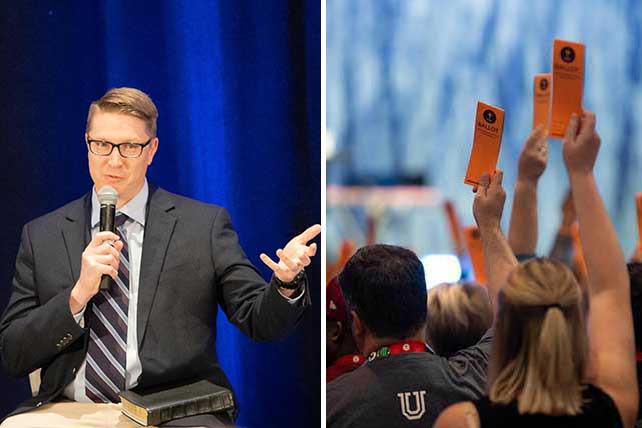
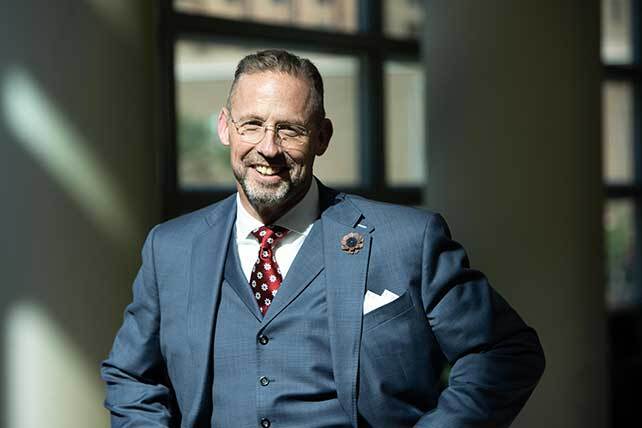
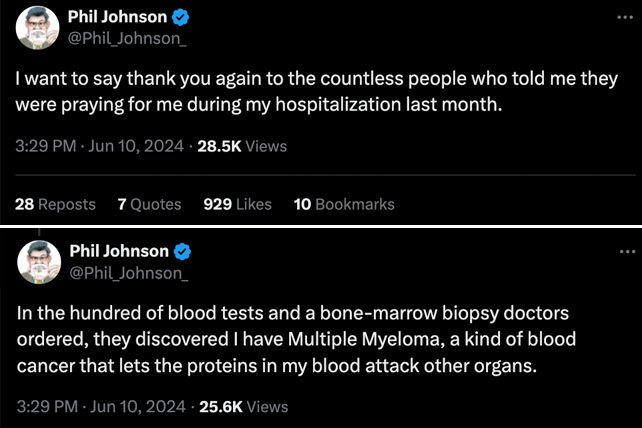

 In the fight for holistic well-being, sometimes it’s easy to make connections between the causes that lead to our stress,
In the fight for holistic well-being, sometimes it’s easy to make connections between the causes that lead to our stress, 




